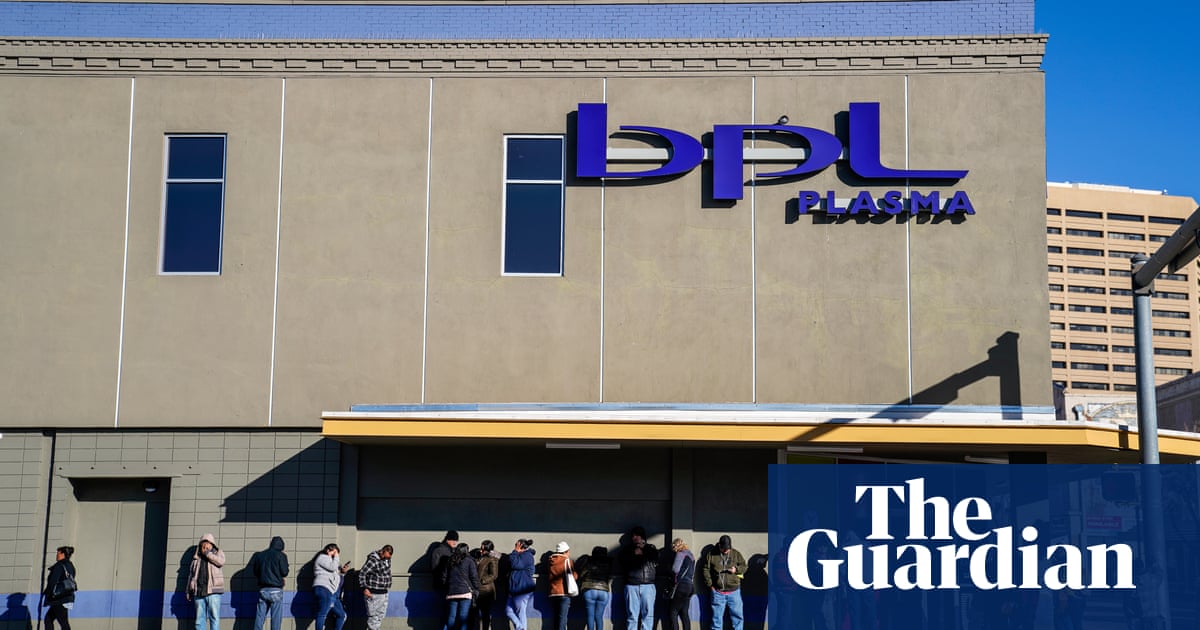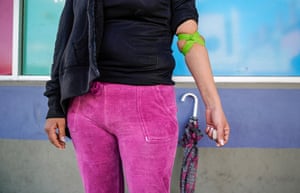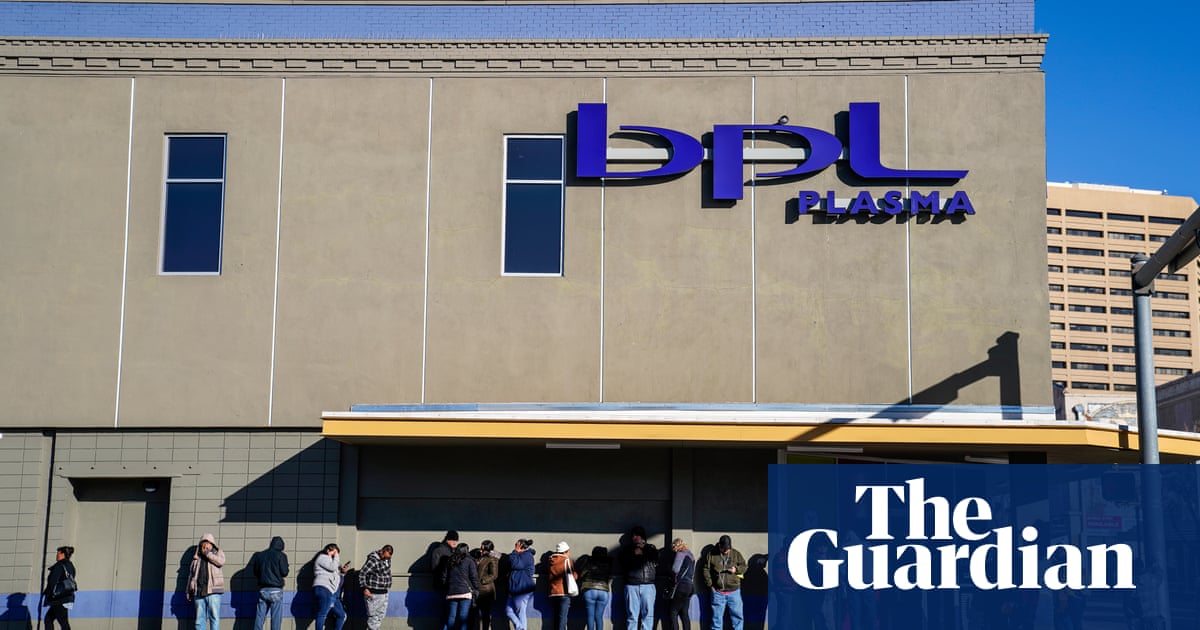How Mexicans help satisfy British demand for blood plasma
A growing source of the UKs blood plasma is from Mexicans crossing the border into the US and donating at high frequencies, which some experts fear could risk their health

The first time I went, I wanted to cry, said Luca, a mother of three, describing how her economic situation would compel her to do the journey from her home in the Mexican border city of Ciudad Jurez to line up outside a blood plasma donation center in El Paso, Texas.
There are more than 800 such facilities in the US and they have been expanding around the southern border in recent years, harvesting plasma of a growing number of Mexicans traveling across the border on temporary visas, in need of cash.
In a regular week, before the coronavirus outbreak, thousands of donors crossed the border into the US to make money this way, which appears to be in a legal gray area.
Some donors have given plasma twice a week for years, and scientific research has shown that high donation frequency can have harmful long-term consequences, including to the immune system.
The UK imports all of its plasma used for the production of medicine from the US. This is a legacy of 1990s fears in the UK over mad cow disease, known as Creutzfeldt-Jakob, though the UK has only recently stepped up importing plasma from the border area.
Q&A
What is plasma?
Plasma is the fluid that holds white and red blood cells in suspension and is of vital importance to its recipients for various medical needs. Its components, including antibodies, are the raw material for the production of life-saving medications used every day in emergency rooms and hospitals to treat immune diseases, stop bleeding, and save babies born to Rh-negative mothers.
The leading supplier is BPL Plasma, whose parent company is based in the UK and which runs 51 plasma centers in the United States, including six based in the border area.
By Saturday, BPL Plasmas El Paso center located just seven blocks from the border bridges was nearly empty of signs of donors, as the Trump administration ordered the border partially closed for 30 days. But as recently as Thursday last week, NDR/the Guardian saw 21 donors waiting in line outside the center before it opened.

Advertisements in Spanish tempt donors with promises of bonuses and large cash rewards worth up to $300 a month for returning visits. It was a desperate move because I lost my waitressing job and became a widow, Luca said.
In Jurez, this is good money, said scar, 42, speaking in February outside BPL Plasma in downtown El Paso. He says he makes twice as much doing this as in his work as a welder.
Sometimes some of these donors come in with their stories, Thats how Im going to get my childrens diapers, or, Thats how were going to eat today if I cant donate, were not eating, said a former BPL employee, who asked not to be named.
Even before the corona crisis hit, Lucia decided she no longer wanted to donate, but prior to new Covid-19 restrictions, plenty of other Mexicans have been meticulously following the permitted donation schedule of coming twice a week.
To accommodate such high numbers of donors, according to a report written by British inspectors in February, BPL runs a shuttle bus to bring donors from the border with Mexico to the plasma center in the town of Laredo, Texas.
Donations collected in the US by BPL Plasma are supplied to BPL Therapeutics, in Elstree, Hertfordshire, where it transforms 1.2m liters of blood plasma per year into life-saving drugs for the UK and dozens of other countries commercially.
BPLs origins in the UK date from the 1950s and it was long owned by the state-run National Health Service (NHS) until 2013, when a majority of the company was controversially sold to Bain Capital, a private equity firm in the US, for 200m. Three years later, Bain sold BPL to the Beijing-based Creat Group for 820m.

For many donors we spoke to, donation is their only income, so the incentive to continue is high, even if they might not feel well. One assistant manager of the BPL Plasma collection center in El Paso that is closest to the border said: 90% of people come from Jurez. Its more compensation than they make in a week at their jobs.
Long-term effects
US regulations permit twice-weekly donations or a total of 104 times a year, while in the UK the limits are twice monthly, or 24 times a year.
Peter Hellstern, director of the Center of Hemostasis and Thrombosis in Zrich, conducted one of the few existing studies on long-term effects of high-frequency plasma donations. His conclusion: it can be safe to donate often, if the antibody level of someones blood is monitored closely at a minimum, before every fifth donation. In the US, this test is routinely conducted every four months, with no minimum threshold. The donor doesnt notice a drop of antibodies, but is far more at risk for infections. Its a trappy situation, Hellstern said.
According to Paul Strengers from the International Plasma Fractionation Association (IPFA), the loss of antibodies may have a highly deleterious effect on the immune system, and in the worst case could lead to potentially deadly infections like pneumonia. This may include also any influenza virus but also the coronavirus, Strengers said, adding that there was no evidence so far of actual infections among high-frequency donors.
In the plasma donation centers, donors the NDR/the Guardian talked to last month said they were not advised in advance of possible long-term health consequences.
BPL Plasma did not respond to all of the questions asked by the Guardian and NDR but said in a statement: BPL collection centers operate in strict accordance with the FDA & industry guidelines that exist to promote the safety of both plasma donors and the patients who use plasma derived therapeutics.
Asked about impact of Covid-19, BPL Plasma said this week that health and safety of staff and donors was their mission, adding: We are closely monitoring guidelines issued by both federal and local authorities and are implementing enhanced safety protocols in our collection centers.
In the UK, the maximum plasma donation allowance is 15 liters per person per year. US regulations permit up to 92 liters per person per year, with two donations in a seven-day period.

The UKs Medicines and Healthcare products Regulatory Agency (MHRA) sends inspectors to plasma centers in the US that export to the UK. Asked about the discrepancy in donation frequencies permitted in the US versus the UK, the agency said it was a question for relevant US authorities.
The US Food and Drug Administration (FDA) said its regulations have been established to ensure that a donor is in good health prior to donation, and added: We recognize that regulators in other countries may reach different regulatory conclusions even when considering the same data.
When asked about the high donation frequency, the PPTA, a private trade organization that represents the for-profit plasma-producing pharmaceutical companies in North America and Europe, said the plasma centers were meeting all FDA standards.
Coronavirus
A reduction in plasma donors because of the Covid-19 crisis could affect the supply chain of plasma shipments to the UK, and Europe, which imports around 40% of its blood plasma from the US. We do expect the rapid spread of Covid-19 could adversely impact the supply of plasma, a BPL Plasma spokesperson said.
Most European countries dont pay donors but rely on paid plasma donations imported from the US. As reporting by ARD German TV and ProPublica has shown, border centers are the countrys most lucrative collection centers, with the most high-frequency donors.
To prevent shortages in times of the global pandemic, blood and plasma donation centers in Europe and the UK are now begging healthy donors to continue giving blood and plasma at home. Alexa Wetzel with PPTA told NDR/the Guardian: It takes seven to 12 months to produce plasma medication. If the numbers of donations drop now, we will see effects within six or seven months. Plasma centers in the US and Europe are also taking several safety measures like creating distance between the donors and measuring fever before donations.

Experts from health agencies, pharmaceutical companies and not-for-profit blood centers say the coronavirus does not affect the safety of plasma medication. Corona is a respiratory virus. All respiratory viruses are not transmittable by blood or plasma, Strengers, of the IPFA, told NDR and the Guardian.
The PPTA issued a statement saying that even if there was plasma collected from an infected donor, the virus would by default be filtered out in the production process.
Visas
The US-Mexican border appears to have become a big draw for drug companies in need of blood plasma. BPL is one of three main pharmaceutical actors along the border, smaller than the Spanish Grifols and Australian CSL, which have been operating in the border area for years.
Most donors dont know if what they are doing is wrong in terms of the legality of using their visa for paid donations.
BPL and other pharmaceutical companies based at the border encourage Mexican donors to use B-1/B-2 temporary visas to cross into the US, even though US immigration law explicitly forbids earning money while visiting the country.
Donation centers get around this language by calling their payments a compensation for time. In a written statement, PPTA said that plasma donors are not employees of donation centers. But for the US immigration authorities, thats not the issue. If people are using a B-1/B-2 visa to cross the border and earn money selling plasma, they could put that document at risk, said Roger Maier of Customs and Border Protection in El Paso. People are being compensated. Theyre being paid.
-
Stefanie Dodt is a New York-based investigative journalist for the German broadcaster NDR and has previously reported on blood donors on the border in partnership with ProPublica: Pharmaceutical Companies Are Luring Mexicans Across the US Border to Donate Blood Plasma. She is on Twitter @StefanieDodt.
-
Samuel Gilbert is a journalist based in the south-western US
Read more: https://www.theguardian.com/world/2020/mar/25/mexico-us-uk-blood-plasma-donations-coronavirus
